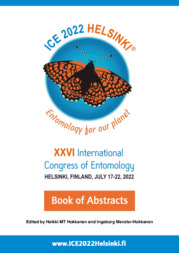Will an exotic, competitive egg parasitoid displace a native larval parasitoid?
Will an exotic, competitive egg parasitoid displace a native larval parasitoid?
Author(s): PARANHOS, B. A. G.; NAVA, D. E.; SÁ, L. A.; NICHOLAS, N.; MORELLI, R.; PONCIO, S.
Summary: Fopius arisanus Soman (Hymenoptera: Braconidae) is a generalist tephritid egg parasitoid from the Indo-Pacific region introduced to Brazil in 2012 to control the exotic fruit fly pest Bactrocera carambolae Drew & Hancock (Diptera: Tephritidae) in the northern region. Doryctobracon areolatus Szépligeti (Hymenoptera: Braconidae) is a native generalist parasitoid of second instar larval fruit flies from Central and South America. Because both species of fruit fly parasitoids share some genera of fruit fly hosts, we evaluated if the commercial release of F. arisanus could cause adverse effects (e.g., competitive displacement) on the native parasitoid. Host preference and competitive ability were compared using as hosts the native Anastrepha fraterculus Wiedemann (Diptera: Tephritidae) and the exotic Ceratitis capitata Wiedemann (Diptera: Tephritidae) fruit fly species. To evaluate host preference, choice and no-choice experiments were conducted with lines of F. arisanus reared from each of the hosts. Laboratory studies showed that F. arisanus accepted only 2-3% of the native hosts compared to 34-41% of the exotic hosts under no choice conditions, with similar results when given a choice of native and exotic hosts. The field cage choice study showed similar results when F. arisanus was reared on the exotic host, but when reared on the native host, F. arisanus parasitized more of the native host than when reared on the exotic host. However, both lines of the parasitoid preferred the exotic host. To evaluate competitive ability, experiments with both species together and separate were conducted in the laboratory and in field cages. Both experiments showed that F. arisanus had no measurable detrimental effect on the native parasitoid in either the native or exotic host. Indeed, the native parasitoid was consistently the superior competitor in native host even though it parasitized larvae while F. arisanus is an egg parasitoid. These results indicated that F. arisanus interacted minimally with the native parasitoid on the native host, and while it interacted with the native parasitoid on the exotic host, it did not detrimentally affect it. Thus, F. arisanus is unlikely to cause adverse effects on the native parasitoid, D. areolatus in Brazil.
Publication year: 2022
Types of publication: Abstract in annals or event proceedings
Unit: Embrapa Semi-arid Region
Keywords: Ceratitis Capitata, Fopius arisanus, Hospedeiros nativos, Insects, Mosca das Frutas, Praga
Observation
Some of Embrapa's publications are published as ePub files. To read them, use or download one of the following free software options to your computer or mobile device. Android: Google Play Books; IOS: iBooks; Windows and Linux: Calibre.
Access other publications
Access the Agricultural Research Database (BDPA) to consult Embrapa's full library collection and records.
Visit Embrapa Bookstore to purchase books and other publications sold by Embrapa.

